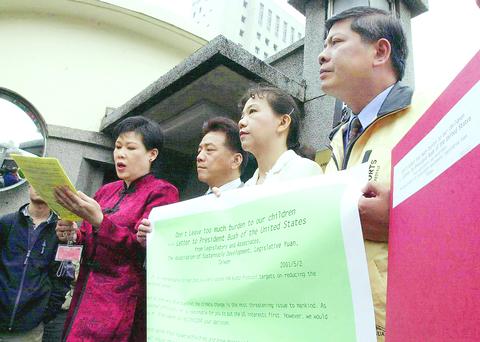Legislators urged the American Institute in Taiwan (AIT) yesterday to forward a letter to the White House urging US President George W. Bush to reverse his decision to abandon the Kyoto Protocol.
The Kyoto Protocol is a UN climate pact which requires major industrialized nations to reduce emissions of carbon dioxide and other pollutants by an average of 5.2 percent below 1990 emissions levels before 2012.

PHOTO: CHIANG YING-YING, TAIPEI TIMES
On March 29, the US announced it had effectively abandoned the pact on the grounds that it does not force developing countries to curb emissions and because Bush said the plan is not in the economic interests of the US.
Bush's decision to kill the protocol angered not only many European countries but also developing countries as well.
Concerned about sustainable development on the planet, legislators from the Association of Sustainable Development (永續發展促進會) and environmentalists from the Taiwan Environmental Protection Union (台灣環保聯盟) yesterday asked the AIT to forward a letter to Bush titled "Don't leave too much burden to our children."
Legislators, including independents Josephine Chu (
Concerning greenhouse gas emissions by various countries, "the UN Framework Convention on Climate Change does emphasize its principle of equal but differentiated responsibilities in regulation," Chu read from the letter at the AIT.
Although developing countries are not bound by the pact, the legislators said that those countries would eventually participate.
Taiwan, as a non-UN member, is not bound by the protocol. But, to avoid any economic sanctions by the international community, Taiwan has been mapping out its own policies in conjunction with international trends in global environmental protection over the last 10 years.
The beginning of such action was prompted in part by the 1987 Montreal Protocol, an international agreement controlling the production and consumption of ozone-depleting substances, such as CFCs, which are used in refrigerators, aerosol propellants and solvents.
To shoulder the responsibilities of preserving natural re-sources with other countries for future generations, Taiwan decided in 1999 to reduce its total emissions of carbon dioxide to 297 million tonnes from an estimated 501 million tonnes by 2020.
Legislators said yesterday that they hoped that the US would come up with innovative strategies to shoulder the responsibility of protecting the planet rather than dismissing the Kyoto Protocol.
William Weinstein, chief of the AIT's economic section received the letter from the legislators. Wienstein however declined yesterday to speak to the media on the issue.
Officials at the AIT public relations office said that the letter would be forwarded as soon as possible to the White House through normal channels but they did not know how long the process would take.
The AIT had no other comment on the letter, explaining that it was addressed to the White House and not their office.

The CIA has a message for Chinese government officials worried about their place in Chinese President Xi Jinping’s (習近平) government: Come work with us. The agency released two Mandarin-language videos on social media on Thursday inviting disgruntled officials to contact the CIA. The recruitment videos posted on YouTube and X racked up more than 5 million views combined in their first day. The outreach comes as CIA Director John Ratcliffe has vowed to boost the agency’s use of intelligence from human sources and its focus on China, which has recently targeted US officials with its own espionage operations. The videos are “aimed at

STEADFAST FRIEND: The bills encourage increased Taiwan-US engagement and address China’s distortion of UN Resolution 2758 to isolate Taiwan internationally The Presidential Office yesterday thanked the US House of Representatives for unanimously passing two Taiwan-related bills highlighting its solid support for Taiwan’s democracy and global participation, and for deepening bilateral relations. One of the bills, the Taiwan Assurance Implementation Act, requires the US Department of State to periodically review its guidelines for engagement with Taiwan, and report to the US Congress on the guidelines and plans to lift self-imposed limitations on US-Taiwan engagement. The other bill is the Taiwan International Solidarity Act, which clarifies that UN Resolution 2758 does not address the issue of the representation of Taiwan or its people in

US Indo-Pacific Commander Admiral Samuel Paparo on Friday expressed concern over the rate at which China is diversifying its military exercises, the Financial Times (FT) reported on Saturday. “The rates of change on the depth and breadth of their exercises is the one non-linear effect that I’ve seen in the last year that wakes me up at night or keeps me up at night,” Paparo was quoted by FT as saying while attending the annual Sedona Forum at the McCain Institute in Arizona. Paparo also expressed concern over the speed with which China was expanding its military. While the US

SHIFT: Taiwan’s better-than-expected first-quarter GDP and signs of weakness in the US have driven global capital back to emerging markets, the central bank head said The central bank yesterday blamed market speculation for the steep rise in the local currency, and urged exporters and financial institutions to stay calm and stop panic sell-offs to avoid hurting their own profitability. The nation’s top monetary policymaker said that it would step in, if necessary, to maintain order and stability in the foreign exchange market. The remarks came as the NT dollar yesterday closed up NT$0.919 to NT$30.145 against the US dollar in Taipei trading, after rising as high as NT$29.59 in intraday trading. The local currency has surged 5.85 percent against the greenback over the past two sessions, central